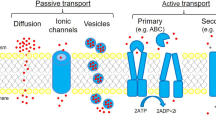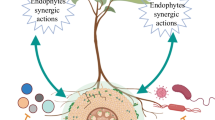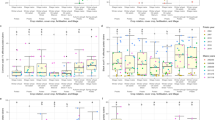Abstract
Aims
Specific soil bacteria can sense and respond to the selective rhizosphere recruitment of root exudates using unique systems of chemotaxis that mediate plant-microbe and microbe-microbe interactions. This study investigates how the bacterial chemotaxis systems have been impacted by selection during the domestication of rice (Oryza species).
Methods
Shotgun metagenomic sequencing and 16S rRNA gene amplicon sequencing were performed to investigate the bacterial chemotaxis systems and chemotactic bacteria in the rhizospheres of wild and cultivated rice. Metabolomics analysis was performed to examine the root metabolites of different accessions of rice.
Results
The bacterial chemotaxis genes exhibited a higher abundance in the rhizospheres of wild rice than cultivated rice, and that the compositional profile of chemotaxis genes was distinctly different between types of rice. Differential selection of chemotaxis systems was at least partially driven by changes in the metabolite profiles of rice roots that were affected by domestication. A core group of chemotactic bacteria was also identified, and specific chemotactic bacteria were found to function as hub taxa in the rhizosphere bacterial community.
Conclusion
The present study provides novel insights into the composition and function of the bacterial chemotaxis systems in the rhizospheres of wild and domesticated rice. It also provides a new perspective on the impact of rice domestication on the assembly of rhizomicrobiome.







Similar content being viewed by others
Data availability
Shotgun metagenomic sequencing and 16S rRNA gene amplicon sequencing data are available on NCBI under the Bioproject accession number PRJNA632564 and PRJNA639671, respectively.
Code availability
Not applicable.
References
Agler MT, Ruhe J, Kroll S, Morhenn C, Kim ST, Weigel D, Kemen EM (2016) Microbial hub taxa link host and abiotic factors to plant microbiome variation. PLoS Biol 14:e1002352. https://doi.org/10.1371/journal.pbio.1002352
Badri DV, Chaparro JM, Zhang R, Shen Q, Vivanco JM (2013) Application of natural blends of phytochemicals derived from the root exudates of Arabidopsis to the soil reveal that phenolic-related compounds predominantly modulate the soil microbiome. J Biol Chem 288:4502–4512. https://doi.org/10.1074/jbc.M112.433300
Bastian M, Heymann S, Jacomy M (2009) Gephi: an open source software for exploring and manipulating networks. ICWSM
Benjamini Y, Hochberg Y (1995) Controlling the false discovery rate: a practical and powerful approach to multiple testing. J R Stat Soc B 57:289–300. https://doi.org/10.1111/j.2517-6161.1995.tb02031.x
Berendsen RL, Vismans G, Yu K, Song Y, de Jonge R, Burgman WP, Burmolle M, Herschend J, Bakker P, Pieterse CMJ (2018) Disease-induced assemblage of a plant-beneficial bacterial consortium. ISME J 12:1496–1507. https://doi.org/10.1038/s41396-018-0093-1
Bolger AM, Lohse M, Usadel B (2014) Trimmomatic: a flexible trimmer for Illumina sequence data. Bioinformatics 30:2114–2120. https://doi.org/10.1093/bioinformatics/btu170
Buchan A, Crombie B, Alexandre GM (2010) Temporal dynamics and genetic diversity of chemotactic-competent microbial populations in the rhizosphere. Environ Microbiol 12:3171–3184. https://doi.org/10.1111/j.1462-2920.2010.02290.x
Bulgarelli D, Rott M, Schlaeppi K, Ver Loren van Themaat E, Ahmadinejad N, Assenza F, Rauf P, Huettel B, Reinhardt R, Schmelzer E, Peplies J, Gloeckner FO, Amann R, Eickhorst T, Schulze-Lefert P (2012) Revealing structure and assembly cues for Arabidopsis root-inhabiting bacterial microbiota. Nature 488:91–95. https://doi.org/10.1038/nature11336
Bulgarelli D, Schlaeppi K, Spaepen S, Ver Loren van Themaat E, Schulze-Lefert P (2013) Structure and functions of the bacterial microbiota of plants. Annu Rev Plant Biol 64:807–838. https://doi.org/10.1146/annurev-arplant-050312-120106
Chang J, Sun Y, Tian L, Ji L, Luo S, Nasir F, Kuramae EE, Tian CJ (2021) The structure of rhizosphere fungal communities of wild and domesticated rice: changes in diversity and co-occurrence patterns. Front Microbiol 12:610823. https://doi.org/10.3389/fmicb.2021.610823
Choi JY, Platts AE, Fuller DQ, Hsing YI, Wing RA, Purugganan MD (2017) The rice paradox: multiple origins but single domestication in Asian rice. Mol Biol Evol 34:969–979. https://doi.org/10.1093/molbev/msx049
Cooper JE (2007) Early interactions between legumes and rhizobia: disclosing complexity in a molecular dialogue. J Appl Microbiol 103:1355–1365. https://doi.org/10.1111/j.1365-2672.2007.03366.x
Edgar RC (2013) UPARSE: highly accurate OTU sequences from microbial amplicon reads. Nat Methods 10:996–998. https://doi.org/10.1038/nmeth.2604
Edgar RC, Haas BJ, Clemente JC, Quince C, Knight R (2011) UCHIME improves sensitivity and speed of chimera detection. Bioinformatics 27:2194–2200. https://doi.org/10.1093/bioinformatics/btr381
Edwards J, Johnson C, Santos-Medellin C, Lurie E, Podishetty NK, Bhatnagar S, Eisen JA, Sundaresan V (2015) Structure, variation, and assembly of the root-associated microbiomes of rice. Proc Natl Acad Sci U S A 112:e911–e920. https://doi.org/10.1073/pnas.1414592112
Fan K, Weisenhorn P, Gilbert JA, Chu H (2018) Wheat rhizosphere harbors a less complex and more stable microbial co-occurrence pattern than bulk soil. Soil Biol Biochem 125:251–260. https://doi.org/10.1016/j.soilbio.2018.07.022
Feng H, Zhang N, Fu R, Liu Y, Krell T, Du W, Shao J, Shen Q, Zhang R (2019) Recognition of dominant attractants by key chemoreceptors mediates recruitment of plant growth-promoting rhizobacteria. Environ Microbiol 21:402–415. https://doi.org/10.1111/1462-2920.14472
Fernandez M, Matilla MA, Ortega A, Krell T (2017) Metabolic value chemoattractants are preferentially recognized at broad ligand range chemoreceptor of Pseudomonas putida KT2440. Front Microbiol 8:990. https://doi.org/10.3389/fmicb.2017.00990
Garbeva P, de Boer W (2009) Inter-specific interactions between carbon-limited soil bacteria affect behavior and gene expression. Microb Ecol 58:36–46. https://doi.org/10.1007/s00248-009-9502-3
Hasegawa T, Kato Y, Okabe A, Itoi C, Ooshiro A, Kawaide H, Natsume M (2019) Effect of secondary metabolites of tomato (Solanum lycopersicum) on chemotaxis of Ralstonia solanacearum, pathogen of bacterial wilt disease. J Agric Food Chem 67:1807–1813. https://doi.org/10.1021/acs.jafc.8b06245
Hu L, Robert CAM, Cadot S, Zhang X, Ye M, Li B, Manzo D, Chervet N, Steinger T, van der Heijden MGA, Schlaeppi K, Erb M (2018) Root exudate metabolites drive plant-soil feedbacks on growth and defense by shaping the rhizosphere microbiota. Nat Commun 9:2738. https://doi.org/10.1038/s41467-018-05122-7
Jacoby R, Peukert M, Succurro A, Koprivova A, Kopriva S (2017) The role of soil microorganisms in plant mineral nutrition-current knowledge and future directions. Front Plant Sci 8:1617. https://doi.org/10.3389/fpls.2017.01617
Jin Y, Zhu H, Luo S, Yang W, Zhang L, Li S, Jin Q, Cao Q, Sun S, Xiao M (2019) Role of maize root exudates in promotion of colonization of Bacillus velezensis strain S3-1 in rhizosphere soil and root tissue. Curr Microbiol 76:855–862. https://doi.org/10.1007/s00284-019-01699-4
Khush GS (2005) What it will take to feed 5.0 billion rice consumers in 2030. Plant Mol Biol 59:1–6. https://doi.org/10.1007/s11103-005-2159-5
Kim H, Lee KK, Jeon J, Harris WA, Lee YH (2020) Domestication of Oryza species eco-evolutionarily shapes bacterial and fungal communities in rice seed. Microbiome 8:20. https://doi.org/10.1186/s40168-020-00805-0
Kovach MJ, Sweeney MT, McCouch SR (2007) New insights into the history of rice domestication. Trends Genet 23:578–587. https://doi.org/10.1016/j.tig.2007.08.012
Kwak MJ, Kong HG, Choi K, Kwon SK, Song JY, Lee J, Lee PA, Choi SY, Seo M, Lee HJ, Jung EJ, Park H, Roy N, Kim H, Lee MM, Rubin EM, Lee SW, Kim JF (2018) Rhizosphere microbiome structure alters to enable wilt resistance in tomato. Nat Biotechnol 36:1100–1109. https://doi.org/10.1038/nbt.4232
Li W, Zhang Y, Li H, Zhang C, Zhang J, Uddin J, Liu X (2020a) Effect of soybean oligopeptide on the growth and metabolism of Lactobacillus acidophilus JCM 1132. RSC Adv 10:16737–16748. https://doi.org/10.1039/d0ra01632b
Li X, Ding L, Li X, Zhu Y (2020b) Abundance, diversity, and structure of Geobacteraceae community in paddy soil under long-term fertilization practices. Appl Soil Ecol 153:103577. https://doi.org/10.1016/j.apsoil.2020.103577
Lisec J, Schauer N, Kopka J, Willmitzer L, Fernie AR (2006) Gas chromatography mass spectrometry-based metabolite profiling in plants. Nat Protoc 1:387–396. https://doi.org/10.1038/nprot.2006.59
Lu H, Chen J, Jia Y, Cai M, Lee PKH (2016) Transcriptomic responses of the interactions between Clostridium cellulovorans 743B and Rhodopseudomonas palustris CGA009 in a cellulose-grown coculture for enhanced hydrogen production. Appl Environ Microbiol 82:4546–4559. https://doi.org/10.1128/AEM.00789-16
Ma B, Wang H, Dsouza M, Lou J, He Y, Dai Z, Brookes PC, Xu J, Gilbert JA (2016) Geographic patterns of co-occurrence network topological features for soil microbiota at continental scale in eastern China. ISME J 10:1891–1901. https://doi.org/10.1038/ismej.2015.261
Magoc T, Salzberg SL (2011) FLASH: fast length adjustment of short reads to improve genome assemblies. Bioinformatics 27:2957–2963. https://doi.org/10.1093/bioinformatics/btr507
Martínez-Romero E, Aguirre-Noyola JL, Taco-Taype N, Julio M-R, Zuniga-Dávila D (2020) Plant microbiota modified by plant domestication. Syst Appl Microbiol 43:126106. https://doi.org/10.1016/j.syapm.2020.126106
Mendes LW, Raaijmakers JM, de Hollander M, Mendes R, Tsai SM (2018) Influence of resistance breeding in common bean on rhizosphere microbiome composition and function. ISME J 12:212–224. https://doi.org/10.1038/ismej.2017.158
Moriya Y, Itoh M, Okuda S, Yoshizawa AC, Kanehisa M (2007) KAAS: an automatic genome annotation and pathway reconstruction server. Nucleic Acids Res 35:W182–W185. https://doi.org/10.1093/nar/gkm321
Mostofa MG, Li W, Nguyen KH, Fujita M, Tran LP (2018) Strigolactones in plant adaptation to abiotic stresses: an emerging avenue of plant research. Plant Cell Environ 41:2227–2243. https://doi.org/10.1111/pce.13364
Neal AL, Ahmad S, Gordon-Weeks R, Ton J (2012) Benzoxazinoids in root exudates of maize attract Pseudomonas putida to the rhizosphere. PLoS One 7:e35498. https://doi.org/10.1371/journal.pone.0035498
Oku S, Komatsu A, Nakashimada Y, Tajima T, Kato J (2014) Identification of Pseudomonas fluorescens chemotaxis sensory proteins for malate, succinate, and fumarate, and their involvement in root colonization. Microbes Environ 29:413–419. https://doi.org/10.1264/jsme2.ME14128
Parkinson JS, Hazelbauer GL, Falke JJ (2015) Signaling and sensory adaptation in Escherichia coli chemoreceptors: 2015 update. Trends Microbiol 23:257–266. https://doi.org/10.1016/j.tim.2015.03.003
Parks DH, Tyson GW, Hugenholtz P, Beiko RG (2014) STAMP: statistical analysis of taxonomic and functional profiles. Bioinformatics 30:3123–3124. https://doi.org/10.1093/bioinformatics/btu494
Perez-Jaramillo JE, Mendes R, Raaijmakers JM (2016) Impact of plant domestication on rhizosphere microbiome assembly and functions. Plant Mol Biol 90:635–644. https://doi.org/10.1007/s11103-015-0337-7
Philippot L, Raaijmakers JM, Lemanceau P, van der Putten WH (2013) Going back to the roots: the microbial ecology of the rhizosphere. Nat Rev Microbiol 11:789–799. https://doi.org/10.1038/nrmicro3109
Raina JB, Fernandez V, Lambert B, Stocker R, Seymour JR (2019) The role of microbial motility and chemotaxis in symbiosis. Nat Rev Microbiol 17:284–294. https://doi.org/10.1038/s41579-019-0182-9
Rao CV, Glekas GD, Ordal GW (2008) The three adaptation systems of Bacillus subtilis chemotaxis. Trends Microbiol 16:480–487. https://doi.org/10.1016/j.tim.2008.07.003
Scharf BE, Hynes MF, Alexandre GM (2016) Chemotaxis signaling systems in model beneficial plant-bacteria associations. Plant Mol Biol 90:549–559. https://doi.org/10.1007/s11103-016-0432-4
Shenton M, Iwamoto C, Kurata N, Ikeo K (2016) Effect of wild and cultivated rice genotypes on rhizosphere bacterial community composition. Rice (N Y) 9:42. https://doi.org/10.1186/s12284-016-0111-8
Tan S, Yang C, Mei X, Shen S, Raza W, Shen Q, Xu Y (2013) The effect of organic acids from tomato root exudates on rhizosphere colonization of Bacillus amyloliquefaciens T-5. Appl Soil Ecol 64:15–22. https://doi.org/10.1016/j.apsoil.2012.10.011
Tindall MJ, Gaffney EA, Maini PK, Armitage JP (2012) Theoretical insights into bacterial chemotaxis. Wiley Interdisciplinary Reviews-Systems Biology and Medicine 4:247–259. https://doi.org/10.1002/wsbm.1168
Tran HT, Krushkal J, Antommattei FM, Lovley DR, Weis RM (2008) Comparative genomics of Geobacter chemotaxis genes reveals diverse signaling function. BMC Genomics 9:471. https://doi.org/10.1186/1471-2164-9-471
Wang M, Yu Y, Haberer G, Marri PR, Fan C, Goicoechea JL, Zuccolo A, Song X, Kudrna D, Ammiraju JS, Cossu RM, Maldonado C, Chen J, Lee S, Sisneros N, de Baynast K, Golser W, Wissotski M, Kim W, Sanchez P, Ndjiondjop MN, Sanni K, Long M, Carney J, Panaud O, Wicker T, Machado CA, Chen M, Mayer KF, Rounsley S, Wing RA (2014) The genome sequence of African rice (Oryza glaberrima) and evidence for independent domestication. Nat Genet 46:982–988. https://doi.org/10.1038/ng.3044
Wuichet K, Zhulin IB (2010) Origins and diversification of a complex signal transduction system in prokaryotes. Sci Signal 3:ra50. https://doi.org/10.1126/scisignal.2000724
Xu J, Zhang Y, Zhang P, Trivedi P, Riera N, Wang Y, Liu X, Fan G, Tang J, Coletta-Filho HD, Cubero J, Deng X, Ancona V, Lu Z, Zhong B, Roper MC, Capote N, Catara V, Pietersen G, Verniere C, Al-Sadi AM, Li L, Yang F, Xu X, Wang J, Yang H, Jin T, Wang N (2018) The structure and function of the global citrus rhizosphere microbiome. Nat Commun 9:4894. https://doi.org/10.1038/s41467-018-07343-2
Zhalnina K, Louie KB, Hao Z, Mansoori N, da Rocha UN, Shi S, Cho H, Karaoz U, Loque D, Bowen BP, Firestone MK, Northen TR, Brodie EL (2018) Dynamic root exudate chemistry and microbial substrate preferences drive patterns in rhizosphere microbial community assembly. Nat Microbiol 3:470–480. https://doi.org/10.1038/s41564-018-0129-3
Funding
This work was supported by the National Natural Science Foundation of China (41920104008, 42007034), the National Key Research and Development Program of China (2016YFC0501202), the Science Foundation of Chinese Academy of Sciences (XDA23070501), the Cooperative Project between CAS and Jilin Province of China (2019SYHZ0039) and the Science and Technology Development Project of Jilin Province of China (20190303070SF, 20200501003GX, YDZJ202101ZYTS006). Publication number 7205 of the Netherlands Institute of Ecology (NIOO-KANW).
Author information
Authors and Affiliations
Contributions
CT conceived and designed the study; JZ and WL helped with the experiment design; HX, YC and DC carried out the experiments; LT and SS collected the samples; YS, LT and JC analyzed the data and prepared figures and tables with the input of WL and L-SPT; YS, WL, L-SPT and CT wrote the manuscript. EEK and JAvV helped with the improvement of the manuscript. All authors read and approved the final manuscript.
Corresponding authors
Ethics declarations
Conflict of interest
The authors declare that they have no conflict of interest.
Additional information
Responsible Editor: Luz E. de-Bashan.
Publisher’s note
Springer Nature remains neutral with regard to jurisdictional claims in published maps and institutional affiliations.
Supplementary Information
ESM 1
(DOCX 792 kb)
Rights and permissions
About this article
Cite this article
Sun, Y., Tian, L., Chang, J. et al. Rice domestication influences the composition and function of the rhizosphere bacterial chemotaxis systems. Plant Soil 466, 81–99 (2021). https://doi.org/10.1007/s11104-021-05036-2
Received:
Accepted:
Published:
Issue Date:
DOI: https://doi.org/10.1007/s11104-021-05036-2




